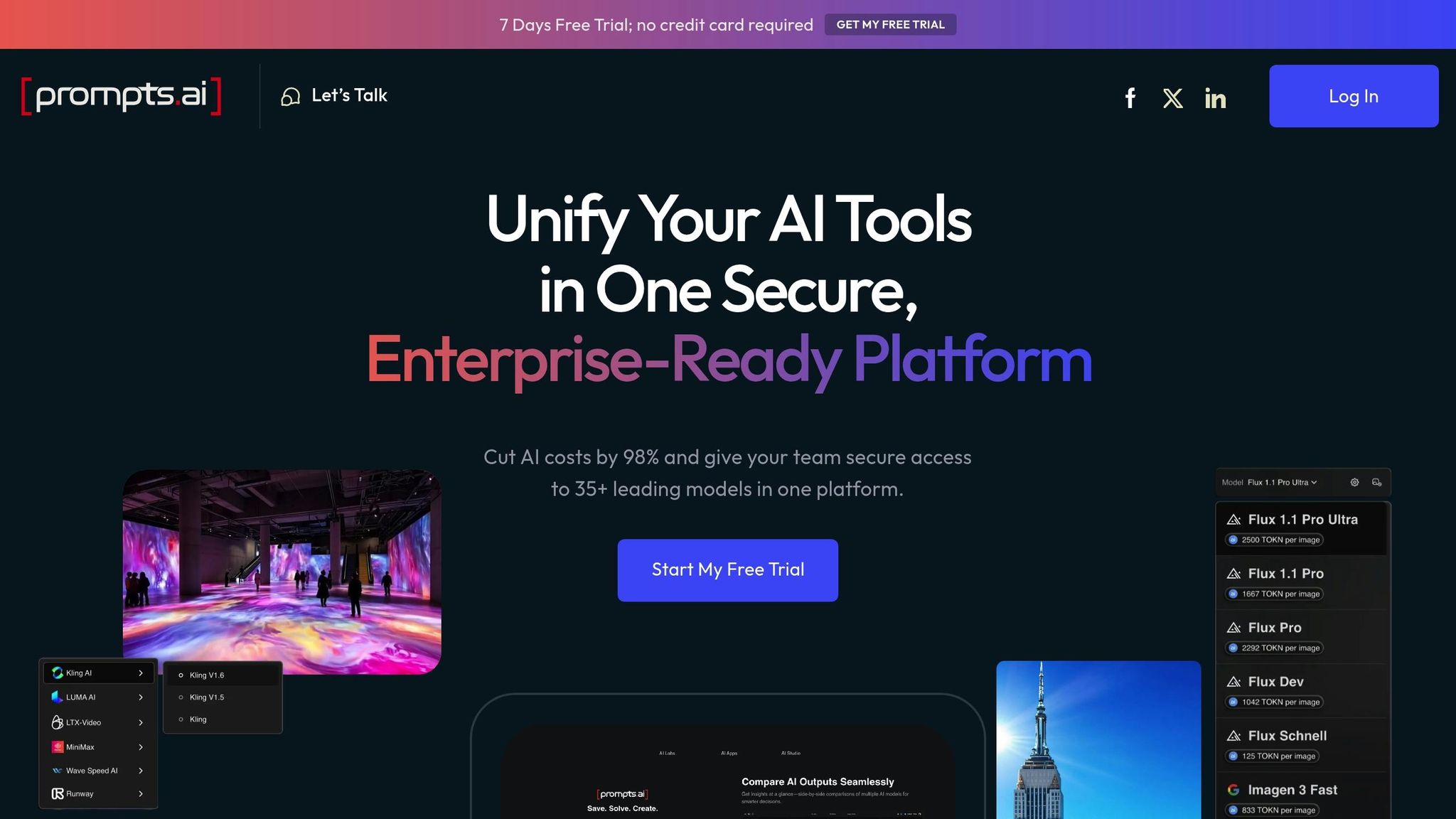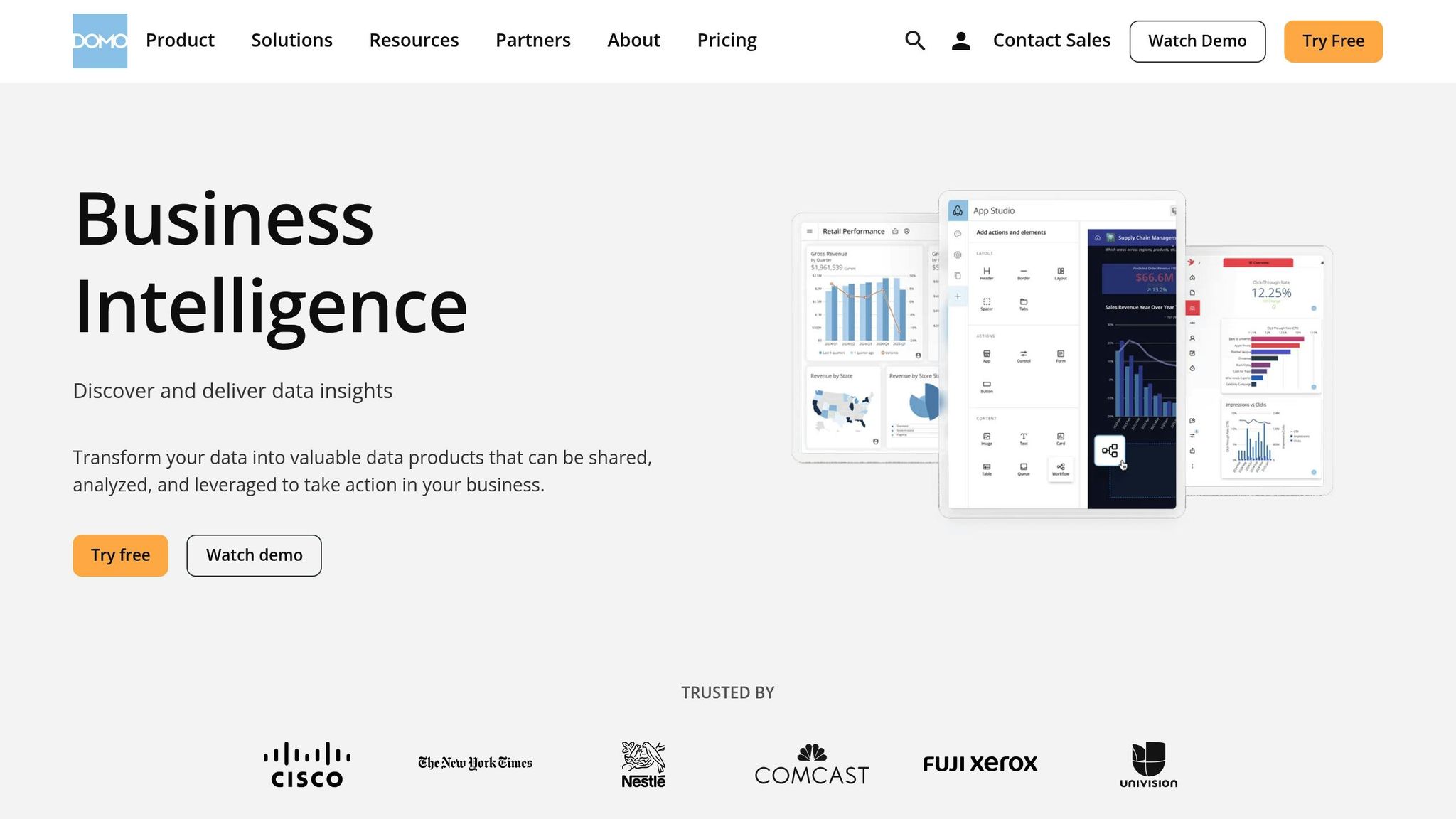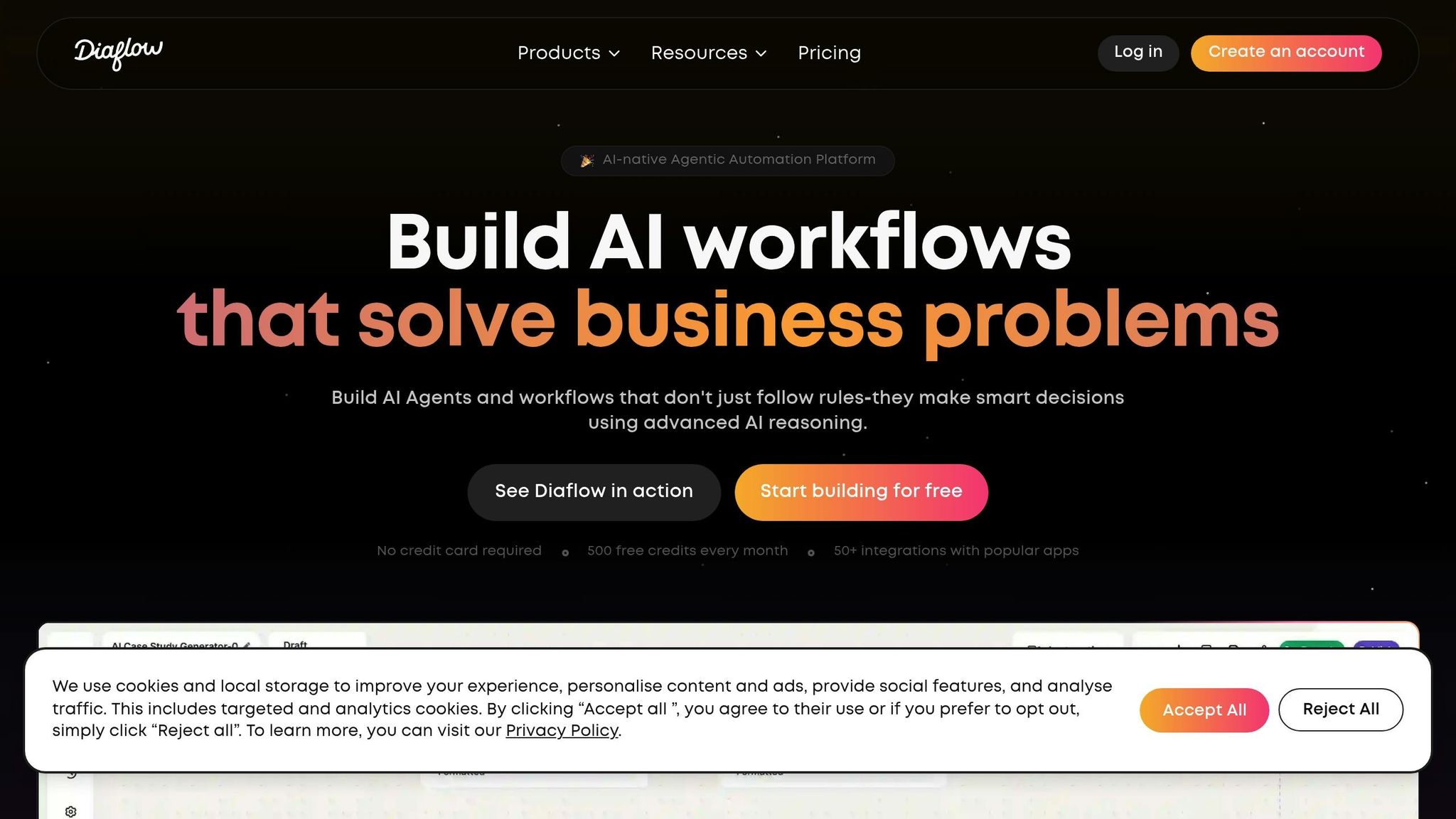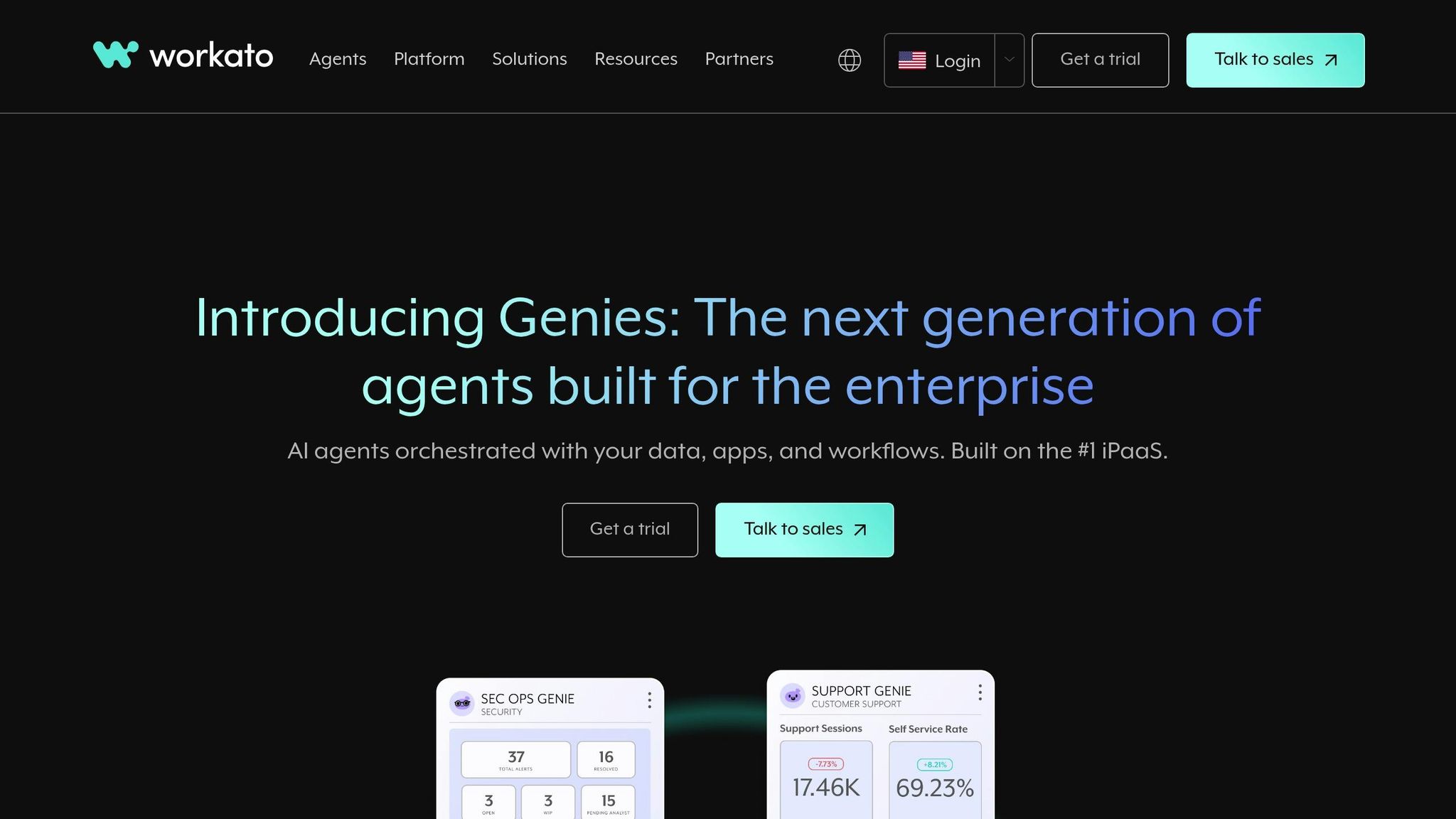
Artificial intelligence (AI) is no longer optional for enterprises - it’s essential for driving growth, improving efficiency, and staying competitive. With 91% of businesses planning to expand AI usage by 2025, the right platform can deliver 30–40% higher efficiency and cut costs by 25–50% through automation. This article highlights six AI platforms designed to address enterprise needs, from workflow automation to cost control, governance, and scalability.
| Platform | Key Features | Best For | Cost Optimization |
|---|---|---|---|
| Prompts.ai | 35+ LLMs, unified interface, TOKN credits | Scalable AI workflows | Up to 98% savings |
| Cflow | 1,000+ app integrations | Workflow automation | Simplifies processes |
| Domo | AI-powered analytics, data visualization | Data-driven decisions | Consumption-based |
| Diaflow | No-code builder, Python support | Customizable workflows | Usage-based pricing |
| Workato | AI-driven integrations, compliance | Complex enterprise setups | Centralized logging |
| Tray.io | Visual automation, real-time sync | Flexible integrations | Usage-based pricing |
Selecting the right AI platform depends on your goals. For cost efficiency and governance, Prompts.ai stands out. For automation and integration, consider Cflow, Workato, or Tray.io. If analytics is a priority, explore Domo. Start small, focus on ROI within 6–18 months, and scale based on proven outcomes.

Prompts.ai steps up as a game-changer in the world of AI workflow platforms, tackling enterprise challenges like AI tool sprawl head-on. The platform offers an enterprise AI orchestration system that eliminates the need for multiple vendor subscriptions. With access to over 35 leading large language models - including GPT-4, Claude, LLaMA, and Gemini - all through a single, unified interface, it keeps businesses flexible and free from vendor lock-in.
Unlike traditional AI solutions, Prompts.ai introduces a pay-as-you-go TOKN credit system, ensuring costs align with actual usage. No more juggling separate subscriptions - just streamlined access to the tools you need.
The following sections explore how Prompts.ai delivers on scalability, smooth integrations, strong governance, and cost efficiency.
Prompts.ai is built to grow with your business. You can add models, users, and teams in minutes, all without creating additional IT burdens. This scalability isn’t limited to user management - it also supports increased workloads across multiple AI models simultaneously.
Whether you're a small team starting with basic text generation or an enterprise managing complex AI workflows for hundreds of users, the platform ensures consistent performance and seamless management.
Modern enterprises need AI solutions that fit seamlessly into their existing systems, not ones that require a complete overhaul. Prompts.ai addresses this with a centralized orchestration approach that works within current technology stacks.
By focusing on eliminating tool sprawl, the platform allows organizations to integrate AI capabilities into their existing workflows without disrupting operations. This design philosophy ensures teams can adopt AI without the steep learning curve of mastering entirely new systems or replacing their current infrastructure.
For enterprises, managing AI responsibly isn’t optional - it’s non-negotiable. Prompts.ai embeds robust governance and audit trails into every workflow, giving organizations complete visibility over their AI interactions across models, teams, and use cases.
With real-time monitoring, administrators can track how AI is being used, ensuring compliance with both internal policies and external regulations. This oversight applies to all 35+ models supported by the platform, providing consistent governance no matter which tools teams choose.
Security is a top priority, with enterprise-grade controls designed to protect sensitive data throughout the AI workflow. These features meet the rigorous standards expected by Fortune 500 companies and highly regulated industries.
AI implementations often come with hidden expenses, but Prompts.ai addresses this with a built-in FinOps layer that tracks and optimizes costs in real time.
The platform can reduce AI software expenses by up to 98%, thanks to its consolidated approach. By combining AI spending into one platform and eliminating redundant vendor subscriptions, businesses can save significantly while simplifying management.
The pay-as-you-go model ensures you only pay for what you use, avoiding wasted budget on underutilized subscriptions. Real-time cost tracking ties AI spending directly to business outcomes, making it easier to justify and refine your investments.
Prompts.ai goes beyond basic cost tracking by offering detailed analytics. These insights help organizations identify which AI models and workflows deliver the best return on investment, enabling smarter, data-driven decisions about future AI strategies.

Cflow is a workflow automation platform built to integrate effortlessly with enterprise systems. It connects with over 1,000 applications, making it a versatile solution for both small businesses and large organizations. The platform empowers users to automate processes without needing deep technical skills, ensuring smooth operations across various tools and systems.
Cflow connects seamlessly with major enterprise applications like SAP, Salesforce, and GSuite, as well as popular business tools such as Slack, QuickBooks, and Zapier. It eliminates the complexity of integration by enabling connections to external databases without any coding requirements.
The platform supports multiple integration technologies, including APIs, webhooks, and direct connections. Configuring these integrations is straightforward, thanks to Cflow's user-friendly interface, which ensures workflows run smoothly and without interruptions.

Domo is a cloud-based business intelligence platform that combines artificial intelligence with data visualization to help businesses process large datasets and gain real-time insights. Its AI-driven analytics engine uncovers patterns, predicts trends, and automates reporting, making it a powerful tool for streamlining operations across departments. Designed for scalability, Domo can handle the demands of enterprises with ease.
Domo’s cloud-native design ensures it can process enterprise-scale data efficiently while maintaining consistent query performance. With an elastic computing infrastructure, it dynamically adjusts resources to meet demand, delivering peak performance even during high-usage periods. The platform also supports a large number of concurrent users and leverages distributed processing to analyze massive datasets without requiring additional hardware investments.
Domo connects seamlessly with leading data sources like Oracle, Microsoft SQL Server, AWS, Salesforce, HubSpot, and Google Analytics through pre-built connectors and real-time synchronization. Its Magic ETL feature uses AI to detect data quality issues and suggest transformation rules, significantly cutting down the time needed for data preparation. Whether through API-based integrations or direct database connections, Domo offers the flexibility to fit various enterprise setups.
Domo adheres to enterprise-grade security standards, including SOC 2 Type II and GDPR compliance, and provides granular access controls to safeguard sensitive information. Its data lineage tracking feature allows businesses to trace the flow of information from its origin to the final reports, ensuring accuracy and supporting regulatory compliance. Additionally, the platform includes audit logs to monitor user activity, enhancing both security and compliance oversight.
Domo’s consumption-based pricing model ensures businesses only pay for the processing and storage they actually use, helping to lower overall costs. Automated data optimization features identify and remove redundant datasets, reducing storage expenses while improving query performance. Administrators can also leverage AI-powered usage analytics to pinpoint underutilized dashboards and reports, enabling smarter licensing and resource allocation. By operating on a cloud infrastructure, Domo eliminates the need for dedicated IT staff to manage hardware, further cutting down operational costs.

Diaflow is a no-code platform designed to simplify the creation of advanced AI workflows. Its drag-and-drop interface makes it accessible even for those without technical expertise, allowing businesses to automate complex processes while maintaining the adaptability needed for large-scale operations.
Diaflow offers smooth integration with existing enterprise systems using its no-code AI workflow builder. For teams requiring custom solutions, a Python node is available to support tailored development needs. The platform comes equipped with essential components like Logic, Merge, Split, Branch, and HTTP Request, which streamline data handling and communication. With options to connect through APIs or pre-built integrations, Diaflow ensures a reliable and consistent flow of data. Additionally, tools like Diaflow Tables enhance productivity by enabling deep integration with other applications and systems. This flexible integration setup supports the creation of scalable, enterprise-wide automation solutions.
Designed to grow alongside enterprise demands, Diaflow's modular architecture supports seamless scaling. Businesses can start with targeted use cases and expand automation efforts over time. Whether implementing simple automations or multi-step workflows, the platform adapts as business needs evolve, making it an ideal choice for gradual, department-wide adoption of AI-driven processes.

Workato combines integration expertise with AI-driven automation to streamline enterprise workflows. As a robust platform, it bridges traditional integration methods with advanced AI tools, automating even the most complex processes while adhering to strict security and compliance standards.
Workato connects thousands of applications, making it an ideal solution for enterprises with diverse technology ecosystems. It seamlessly integrates both cloud-based and on-premises systems, facilitating smooth data exchange between legacy infrastructure and modern AI applications. Its user-friendly, recipe-based approach enables anyone - technical or not - to design integrations without needing extensive coding skills.
AI agents within Workato act as intelligent connectors, triggering actions and automating workflows to reduce manual intervention.
Workato addresses enterprise governance requirements with advanced features like role-based access control (RBAC), workspace federation, and end-to-end encryption with hourly-rotated keys. For organizations needing heightened security, options like Bring Your Own Key (BYOK) and External Key Management (EKM) are available.
The platform complies with key industry standards, including PCI-DSS Level 1, ISO 27001, ISO 27701, SOC 2 Type 2, HIPAA, and GDPR. For AI-specific governance, Workato treats AI agents as system users with defined identities and scoped access. It employs structured prompts and contextual grounding to ensure generative AI operates within set boundaries, preventing errors or unauthorized actions. Every AI agent’s activity is logged, creating detailed audit trails that document triggers, decision-making processes, and execution outcomes. This comprehensive compliance framework ensures secure and dependable automation for enterprise users.
Workato is built for scale, supporting enterprise-level deployments with features like environment separation and regional data centers to meet data residency requirements. The platform handles high transaction volumes with ease, ensuring reliability even under demanding conditions.
By integrating centralized logging and real-time audit streams with SIEM systems, Workato helps lower licensing expenses and operational costs, offering a cost-effective solution for enterprises.

Tray.io delivers enterprise-grade automation through its intuitive visual workflow builder and integration platform. It empowers business users to create sophisticated automations without needing advanced technical expertise, all while adhering to strict enterprise security requirements.
Tray.io stands out for its ability to connect a wide range of applications using pre-built connectors, enabling businesses to streamline their tech ecosystems. Its drag-and-drop interface simplifies the process of building complex integrations, allowing users to link services, APIs, and databases without writing a single line of code. The platform supports standard protocols such as REST APIs, GraphQL, and SOAP, alongside custom integrations, making it versatile enough for diverse enterprise systems.
The platform also ensures smooth, real-time data synchronization across applications, helping departments stay aligned with accurate and up-to-date information. With advanced data transformation tools, users can filter, map, and adjust data as it moves between systems, preserving data accuracy and consistency throughout the integration process.
Designed with a cloud-native architecture, Tray.io automatically scales to meet fluctuating workload demands. Its elastic scaling adjusts resources dynamically, ensuring steady performance during high-demand periods while keeping costs in check during quieter times. Additionally, the platform supports multi-environment setups, allowing teams to separate development, testing, and production workflows. This structure helps enterprises thoroughly test integrations before deploying them, reducing the risk of disruptions to live operations.
Tray.io offers robust governance features to ensure enterprise-level security and control. Role-based access controls manage who can view or edit workflows, with permissions tailored to specific roles or departments. For sensitive automations, administrators can implement approval workflows to ensure proper oversight before activation.
The platform also provides comprehensive audit logs, tracking workflow executions, data transformations, and user actions for full transparency. Security features include SOC 2 Type II compliance, single sign-on (SSO) integration, and IP whitelisting, reinforcing its commitment to maintaining enterprise security standards.
Tray.io employs a usage-based pricing model, charging only for active workflows. This approach eliminates fixed licensing fees, making it especially appealing for organizations with fluctuating automation needs. Seasonal businesses, for example, can scale costs in line with activity levels. The platform’s real-time monitoring dashboard offers detailed cost and usage analytics, helping administrators identify inefficiencies and avoid unexpected expenses. By optimizing resource usage and eliminating the need for dedicated integration infrastructure, Tray.io reduces IT operational costs while improving automation reliability.
These features collectively position Tray.io as a powerful tool for enterprises seeking seamless integration, scalability, and cost-effective automation solutions.
Building on the platform analysis, let's weigh their strengths and challenges. When evaluating enterprise AI solutions, focus on scalability, usability, and integration capabilities. These aspects are crucial for a direct comparison of the platforms discussed.
Take Prompts.ai as an example. It stands out with enterprise-grade features such as effective cost management and seamless integrations. By consolidating over 35 language models into a unified pay-as-you-go system, it simplifies cost tracking while ensuring governance. This centralized approach is particularly beneficial for enterprises aiming to manage AI workflows efficiently and maintain control.
For other platforms, consider how accessible they are, how well they scale with your needs, and whether their pricing structures are transparent. Each of these factors plays a role in determining how well a solution fits into your organization's ecosystem.
Ultimately, selecting the right platform hinges on aligning your technical requirements and growth plans with your organization's priorities. Use clear criteria to ensure your AI investments support your strategic objectives effectively.
When choosing an AI solution, it's essential to align your decision with your enterprise's unique needs, budget, and technical priorities. Prompts.ai offers a unified, pay-as-you-go AI orchestration platform designed to be both cost-effective and versatile. For organizations focused on workflow automation, Cflow is a solid choice for straightforward processes, while Workato is better suited for managing complex enterprise-level integrations. If your priority is data visualization and analytics-driven decisions, Domo stands out with its robust business intelligence capabilities.
Financial considerations also play a significant role in selecting the right platform. Custom AI implementations can cost anywhere from $50,000 to over $500,000. However, research shows that well-implemented AI solutions can lead to cost reductions of 15–30% in targeted processes and productivity gains of 20–35%. With AI budgets projected to grow by 36% in 2025, increasing from an average of $62,964 to $85,521 per month, managing costs effectively becomes a top priority. Yet, only 51% of organizations feel confident in evaluating AI ROI, underlining the need for platforms that offer clear spending and performance insights.
Prompts.ai is the ideal choice for enterprises seeking broad access to powerful models coupled with transparent pricing. On the other hand, platforms like Domo or Workato are better suited for organizations with specific, niche requirements. Interestingly, 63% of enterprises now prefer hybrid pricing models, suggesting that combining multiple solutions tailored to different needs might be more effective than relying on a single platform.
Ultimately, the key to sustainable AI adoption lies in balancing functionality, cost efficiency, and seamless integration. Begin with focused implementations that aim to deliver ROI within 6–18 months. From there, scale your efforts based on proven outcomes, ensuring your AI strategy aligns with your organization's maturity level and long-term objectives. By doing so, you'll position your enterprise to harness the full potential of AI while maintaining financial and operational clarity.
Prompts.ai introduces a pay-as-you-go TOKN credit system, designed to let enterprises pay solely for the tokens they use during AI interactions. This straightforward model eliminates the burden of traditional subscription fees, ensuring businesses only incur costs based on actual usage.
This approach can slash expenses by as much as 98%, aligning costs directly with activity. By adopting this system, enterprises gain greater control over their budgets, enjoy predictable expenses, and can scale AI operations efficiently - all without the risk of overspending. It's a smart way to manage AI-driven workflows with precision and clarity.
When choosing an AI platform, businesses should prioritize its ability to meet their unique goals while working smoothly with their current systems. Look for features like scalability, robust security, and adherence to industry regulations to ensure a solid foundation.
Ease of use and customization options are equally important, as they allow teams to tailor the platform to their workflows. Don’t overlook the quality of vendor support, which can make a big difference in resolving issues quickly. Lastly, assess whether the platform is designed to evolve alongside your organization’s changing demands. Focusing on these factors will help ensure the AI solution delivers meaningful, long-term results.
To effectively gauge the return on investment (ROI) of AI initiatives, businesses need to evaluate both short-term wins and long-term achievements that align with their overall strategic objectives. Key metrics to monitor include revenue growth, increased productivity, and reduced project timelines. Together, these indicators help paint a clear picture of how AI is contributing to business success.
Another critical factor to consider is the total cost of ownership (TCO) - this includes expenses related to deployment, maintenance, and ongoing operations. By weighing these costs against tangible benefits, organizations can better understand the value their AI investments bring. With AI budgets expected to expand significantly in the coming years, this structured approach equips businesses to evaluate their returns confidently and make informed, data-backed decisions for future investments.


